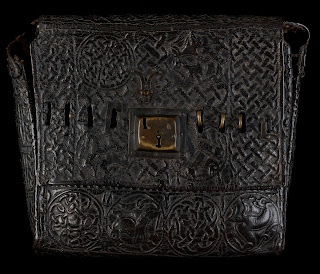 |
| Book of Armagh Satchel. Source: TCD |
September 3 is the feast of Saint Lon-garadh, a saint with a reputation as one of the chief scholars of Ireland. I have previously posted a full account of this saint here, but below a reminder of the famous story about how the book satchels fell to the ground in all the monasteries of Ireland in sorrow at his death. Sadly, little historical information has survived about Saint Lon, but the legend associated with him was mentioned in the first lecture given by Professor Eugene O'Curry in March 1855 at the Catholic University of Ireland:
There is a curious account of a private collection of books, “of all the sciences", as it is expressed, given in a note to the Féliré, or metrical Festology of Aengus Celé Dé, or the "Culdee"; it is to this effect: Saint Colum Cille having paid a visit to Saint Longarad of Ossory, requested permission to examine his books, but Longarad having refused, Colum then prayed that his friend should not profit much by his refusal, whereupon the books became illegible immediately after his death; and these books were in existence in that state in the time of the original author, whoever he was, of the note in the Féliré.
The passage is as follows: it is a note to the stanza of the great poem, for September 3; which is as follows:"COLMAN OF DROM-FERTA,LONGARAD, A SHINING SUN;MAC NISSE WITH HIS THOUSANDS, FROM GREAT CONDERE".[NOTE.]—"Longarad the white-legged, of Magh Tuathat, in the north of Ossory (Osraighé); i.e., in Uibh Foirchellain; ie in Magh Garad, in Disert Garad particularly, and in Cill Gabhra in Sliabh Mairge, in Lis Longarad. The ‘white legged', i.e., from great white hair which was on his legs; or his legs were transparently fair. He was a Suidh (Doctor or Professor) in classics, and in history, and in judgment (law), and in philosophy [filidecht]. It was to him Colum Cille went on a visit; and he concealed his books from him; and Colum Cille left a ‘word' [of imprecation] on his books, i.e., 'May it not be of avail after thee', said he, that for which thou hast shown inhospitality'. And this is what has been fulfilled, for the books exist still, and no man can read them. Now, when Longarad was dead, what the learned tell us is, that all the book-satchels of Erinn dropped [from their racks] on that night. Or they were the satchels which contained the books of sciences [or, professions] which were in the chamber in which Colum Cille was, that fell. And Colum Cille and all that were in that house wondered, and they were all astounded at the convulsions of the books, upon which Colum Cille said: 'Longarad', said he, in Ossory, i.e., a Sai (Doctor) in every science [it is he] that has died now'. 'It will be long until that is verified', said Baithin. May your successor [for ever] be suspected, on account of this', said Colum Cille; et dixit Colum Cille:
Lon is dead [Lon is dead];To Cill Garad it is a great misfortune;To Erinn with its countless tribes;It is a destruction of learning and of schools.Lon has died, [Lon has died];In Cill Garad great the misfortune;
It is a destruction of learning and of schools,
To the Island of Erinn beyond her boundaries".However fabulous this legend may appear, it will suffice, at all events, to show in what estimation books were held in the time of the scholiast of the works of Aengus, and also the prevalent belief in his time in the existence of an Irish literature at a period so long antecedent to his own. The probability is that the books were so old at the time of this writer as to be illegible, and hence the legend to account for their condition.
Eugene O’Curry, Lectures on the Manuscript Materials of Ancient Irish History (Dublin, 1861), 17-18.
Content Copyright © Omnium Sanctorum Hiberniae 2012-2023. All rights reserved.

No comments:
Post a Comment